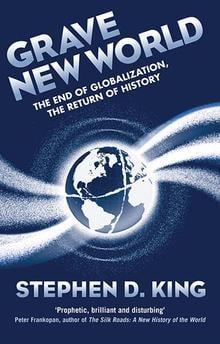 Grave New World: The End of Globalization, the Return of History, Stephen D. King (New Haven: Yale University Press, 2017), 304 pp., $30 cloth, $20 paper, $14.99 eBook.
Grave New World: The End of Globalization, the Return of History, Stephen D. King (New Haven: Yale University Press, 2017), 304 pp., $30 cloth, $20 paper, $14.99 eBook.
In his ambitious new work, Grave New World, British economist Stephen D. King paints a solemn though perhaps realistic picture of the future of globalization. In six key claims, King argues that globalization—which he notes extends “beyond market forces” (p. 12)—is not an inevitable component of the twenty-first century. Rather, multiple challenges will continuously threaten the widespread realization of its benefits and contribute to its existing fragility. Among these challenges, he identifies the three most disruptive trends as rising global immigration and migratory patterns, the enhancement of technology, and the growing inequality gap between the rich and the poor, which has been heightened by a strong “spirit of elitism” (p. 104). While these challenges are not necessarily unique to the twenty-first century, King argues that each has intensified significantly and thus, taken together, they warrant greater international attention.
King takes readers through the history of globalization and, refreshingly, offers six distinct “versions” of globalization that are informed by cultural mythology and history: Western, Chinese, Ottoman, Russian, Persian, and African. His descriptions provide context for many contemporary global challenges, such as various perspectives on the laws of trade, environmental responsibilities, the use of technology, and the responsibility to protect, to name only a few. He warns that “the future of globalization is up for grabs” (p. 7), especially given the United States’ notable retreat from global affairs, and thus suggests that there is a large vacuum of power waiting to be filled. While not his primary focus, the author provides a timely discussion regarding the dangers of American isolationism.
Notably, King does not glorify the endurance of globalization as we have come to know and understand it, but rather provides a frank discussion of its negative and positive effects. He rightly captures its dangers and major pitfalls—particularly its inconsistent effects on different regions, economies, and cultures—while also highlighting the importance of global institutions, trade, and immigration. Evoking Churchill, he admits that “globalization is the worst form of economic arrangement, except for all the others” (p. 243).
While Grave New World is mainly a historical account with economic concepts interwoven throughout, King also provides readers with a thought experiment involving different options for the future of globalization. And he stresses that regardless of which option is ultimately chosen, some form of compromise will be essential, raising the important but unanswered question of who is ultimately responsible for making this choice.
More in this issue
Winter 2018 (32.4) • Review Essay
Human Rights Under Attack: What Comes Next?
Micheline Ishay laments the recent onslaught against the human rights movement even from professed supporters, taking Samuel Moyn’s recent book Not Enough as indicative ...
Winter 2018 (32.4) • Review
Just Responsibility: A Human Rights Theory of Global Justice, by Brooke A. Ackerly
This book offers a clear argument for assuming political responsibility toward basic structures of injustice in the developing world.
Winter 2018 (32.4) • Essay
Ethical Dilemmas in Cyberspace
This final roundtable essay steps back to highlight three broad issues that cut across the other contributions and raise ethical concerns about our activity online. ...